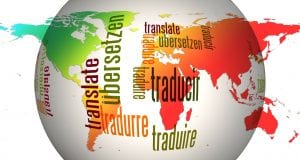Litigation is a hostage to exact language. Firms that handle multilingual cases need to have access to professional translators well before the start of the case.
Litigation is a hostage to exact language. A poorly worded contract or a testimony that’s unclear can be enough to swing the outcome of an entire case. And that’s when only a single language is involved. When disputes include multiple languages, then expert legal translation is essential. Without it, cases can crumble, frustrating all those involved and preventing justice from being done.
Why is Legal Translation Important?
Legal translation enables court cases to go ahead when those involved speak different languages. It plays an important role in enabling justice to be carried out.
Legal translation and interpretation can be required for a wide range of court proceedings – they aren’t just limited to being used in immigration cases. From the family courts to first degree murder trials, there are plenty of examples of legal translation being used to ensure that cases can go ahead in a way that is fair to all those involved.
However, not all legal translation services were created equal. While they enable the majority of court cases involving multiple languages to run smoothly, there have been instances of legal translation services failing. In some instances, poor legal translation has led to unfavorable verdicts and cases collapsing entirely.
Linguistic Lapses That Lost Cases
One of the most well-known cases involving a legal translation fail comes from Canada. Back in 2012, a Hindi-speaking Indian citizen, who was working in Canada, was involved in a sexual assault trial. One can only imagine the emotional distress that such a case comes with, but it was made even worse by the court interpreter’s poor translation skills.
The interpreter made a number of mistakes while translating the victim’s testimony, including mistranslating “sexual assault” as “physical assault,” “two days” as “a couple of days” and “genital area” as “between the legs.” In the end, the legal translation mistakes led to the collapse of the case, with Canadian Superior Court Justice Anthony Hill declaring a mistrial.

Nor is it just human translation than can cause problems when it comes to legal matters, as Mexican native Omar Cruz-Zamora discovered when he was stopped by the police while driving in the US on a legal visa. Cruz-Zamora did not speak enough English to converse with police in Kansas, where he was pulled over.
To deal with the legalities of the situation, those present turned to a Google Translate app for support. Based on that translation, Mr. Cruz-Zamora allowed the officers to search his car, despite not being legally required to.
Upon searching the vehicle, officers discovered 14 pounds of cocaine and methamphetamines. When the case went to court, however, the judge granted Cruz-Zamora’s motion to suppress the evidence, based on the fact that Google Translate is not sufficient for constitutional search purposes. Another legal translation fail.
Poor legal translation can cause issues with court cases around the world. In Northern Ireland, for example, a rape trial at Craigavon Crown Court collapsed due to the quality of the legal interpretation. The judge ruled that the legal translations provided by the interpreter were inaccurate and unreliable, irreparably compromising the case.
Over in England, meanwhile, a case was adjourned three times because an interpreter could not be found for the Hindi-speaking defendant. In the end, the judge decided to proceed with a Panjabi interpreter and that the court should “go as far as we can” with the case.
Translation Options for Law Firms
Law firms handling legal cases involving more than one language have a range of translation options available to them.
Translation agencies tend to be the preferred choice. They deliver networks of translators and interpreters from around the globe. Many specialize in legal translation, meaning that law firms can rely on them as trusted, long-term partners who can see them through a wide range of cases.
Freelance translation and interpretation professionals can also provide legal expertise. Law firms can work closely with freelancers, just as they do with translation agencies, establishing long-term relationships that can span multiple cases.
The agency versus freelancer debate is one that requires careful consideration. Each has its advantages. Freelancers tend to have lower costs than agencies, but agencies have somewhat more flexibility in terms of managing staff sickness and providing support for additional languages, if required.
Machine translation is, of course, also an option, but it is one that is best avoided. As the ruling mentioned above made clear, Google Translate and the like are not sufficient for legal purposes. Law firms that rely on machine translation would do well to change their approach swiftly.
The Verdict on Avoiding Translation Trauma
The cases outlined above make the importance of high-quality legal translation clear. Translators and interpreters need to be able to convey the details of the case accurately and succinctly in order that the proceedings can run smoothly.
In terms of best practice, legal firms that handle multilingual cases need to have access to professional translators well before the start of the case. This means not leaving sourcing a translator to the last minute. Finding a reliable and skilled translator at the outset of the case means that the linguist can be brought up to speed in plenty of time. It also means that there is sufficient time to double check the translator’s language skills – before the case comes to court!
As these examples have shown, the right legal translation support can avoid unfavorable court case outcomes. Not only is this important for the parties involved in the case, and for avoiding undue emotional distress when collapsed cases have to be retried, it also has a bearing for the taxpayer, given the nature of the funding of the legal system. Aside from anything else, poor legal translation is a huge waste of time for all concerned. That’s why law firms must ensure from the outset of each case that they have the ideal legal translation support in place. That means using skilled, knowledgeable and experienced legal translators who can maximize their chances of a successful outcome.


Join the conversation!